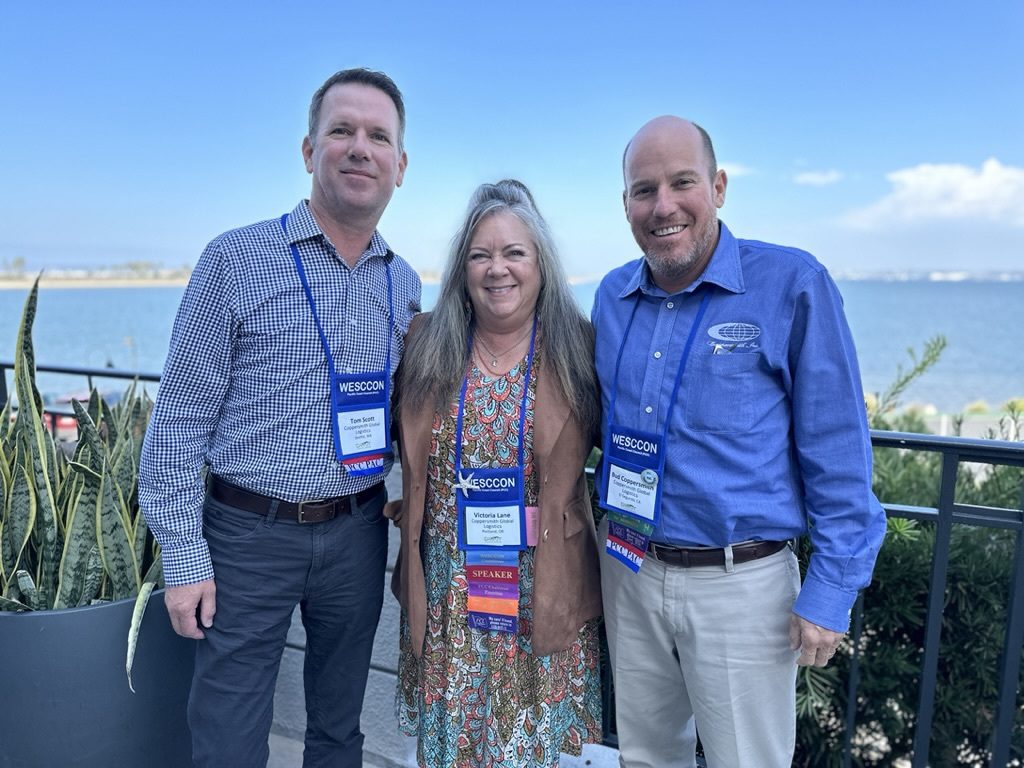Executive Vice President Bud Coppersmith, Vice President of Corporate Compliance and Portland Branch Manager Victoria Lane and Director of Operations Tom Scott attended the annual WESCCON conference of west coast Customs brokers and freight forwarders in San Diego, California, earlier this month.
WESCCON is an opportunity for logistics companies doing business anywhere along the west coast – from the Canadian to the Mexican borders – to gather, hear from senior government officials from Washington as well as attorneys, sureties and officials from the major gateway ports. Also featured is the Pacific Coast Council’s lobbyist Peter Friedmann who brings his “Man from DC” report on the state of trade regulations and legislation being discussed in Washington.
The issues which we took away as most important for our clients covered the topics of forced labor, the status of Section 301 and what Congressional legislation is doing that impacts importers and exporters.
Across a number panels the issue of forced labor was discussed, not just in the context of the Xinjiang region of China, but also touching on things like cobalt mines in the Democratic Republic of Congo. Cobalt is a core mineral for electronics and electric vehicle batteries and at the keynote, attendees saw a video that included children as young as eight and nine years old mining for the mineral. Cobalt, coupled with other products which are targeted by Withhold Release Orders (WRO’s) and the Uyghur Forced Labor Prevention Act (UFLPA) are being detained and held at ports of entry around the United States as cargo owners work to prove to CBP that the products were produced without the use of forced labor.
The China Section 301 tariffs which have been in place now across two administrations remain and the U.S.TR plans to accept comments beginning November 15th on how effective they have been to date. Following consultations with affected domestic parties, U.S.TR announced as part of their statutory four-year review that the tariffs have been effective in the eyes of those domestic respondents.
Interestingly, Peter Friedmann said that they should now be called the “Trump/Biden Tariffs” because the current administration seems disinclined to do away with them anytime soon. They serve as an effective carrot and stick as the administration attempts to negotiate with the Chinese on a number of issues.
Friedmann also warned the audience that global trade patterns are shifting from efficiency to other priorities which will impact people over the next ten years. Supply chains which had gone to the lowest cost, most efficient point of manufacture, are now considering things like climate impact, labor standards and proximity to market. He continued that despite the 301 tariffs that were meant to make Chinese goods too expensive to purchase, China still remains America’s largest non-North American trading partner.
What will impact manufacturing decisions, as the recent CHIPS Act has demonstrated, is what products will be moved back to the United States that have national security implications. Continued restrictions by the administration on technology exports are meant to curb China’s advancement in areas like AI as well as preventing the technology from being stolen and modified or developed for military or defense use.
The conference was overall extremely informative. We haven’t even touched on issues like bond stacking, cargo insurance, the outlook on port congestion and OSRA. For more information on these topics, reach out to us and one of our professional staff will contact you directly to discuss them in greater detail.
